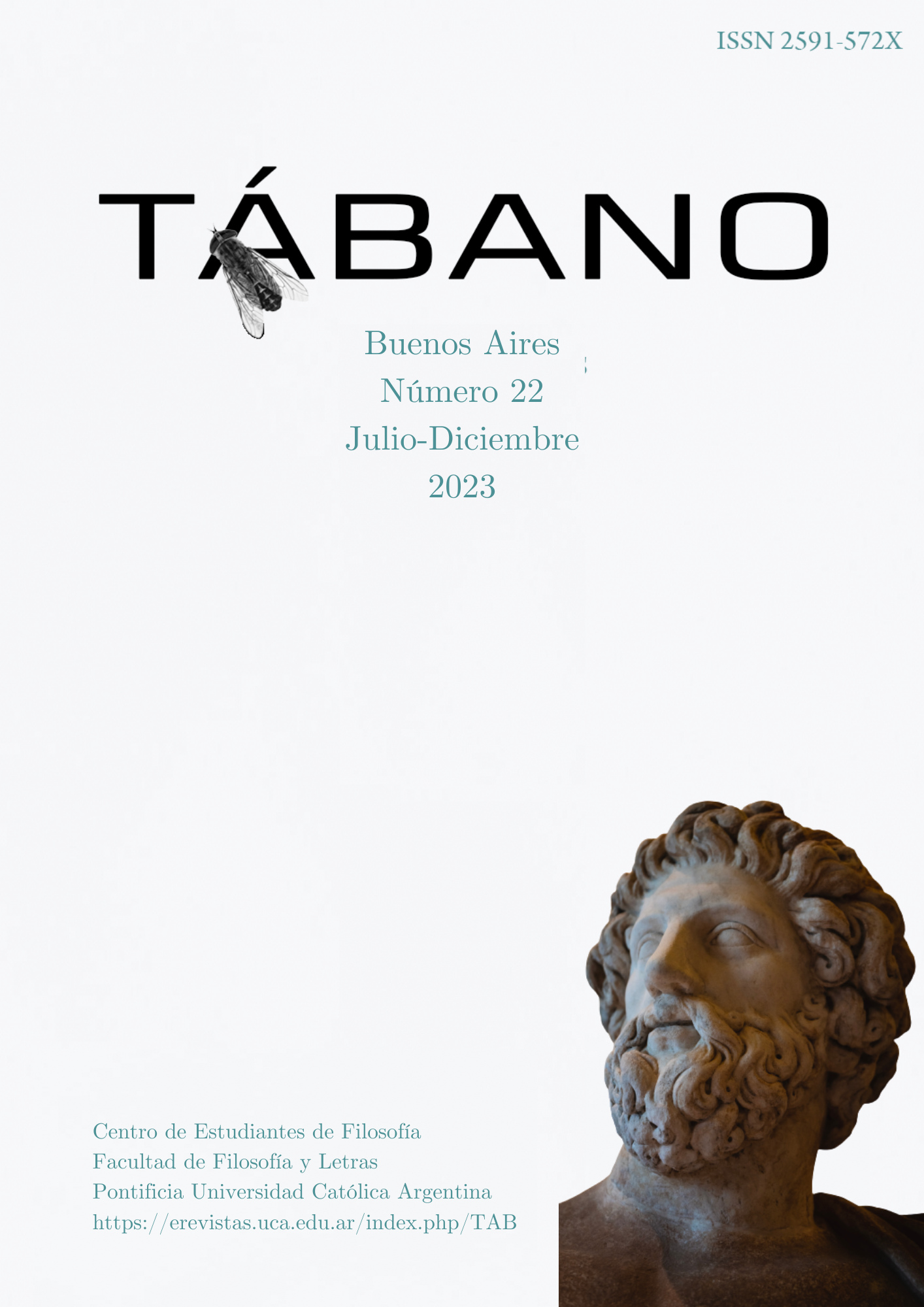Sobre el uso y abuso de los conceptos de Deleuze y Guattari en la filosofía de Bernard Stiegler
DOI:
https://doi.org/10.46553/tab.22.2023.p8-39Palabras clave:
Deleuze, Guattari, Stiegler, sociedades de control, técnica, postmediaResumen
En mi opinión, Bernard Stiegler continúa la exploración de Félix Guattari de la era postmediática iniciada por la revolución digital. A su manera, Stiegler se centra en los efectos psicológicos y sociales de esta revolución, como el trastorno por déficit de atención y el declive de la inteligencia, que Guattari no pudo anticipar del todo. La filosofía de Stiegler actualiza la obra de Deleuze y Guattari sobre la servidumbre voluntaria y, al combinar sus conceptos con los de Deleuze y Guattari, aporta una nueva forma de pensamiento postmediático en el Antropoceno, desafiando las interpretaciones nihilistas. La tesis de las tres ecologías de Guattari es relevante para la filosofía de Stiegler, pero éste rechaza la “resistencia” y aboga por la invención y la creación de herramientas terapéuticas, proponiendo el concepto de bifurcación en el contexto del Antropoceno, como un nuevo concepto de transformación. La obra de Stiegler también contribuye a actualizar el marxismo de Deleuze, reaplicando conceptos como la proletarización, el trabajo inmaterial, la industria cultural y la crítica del marketing en la era del capitalismo computacional, y su obra suscita una reevaluación de la razón frente al dominio del cálculo en una era de posverdad. En definitiva, la filosofía de Stiegler es coherente con la perspectiva inmanente, atea y de este mundo de Deleuze y Guattari.
Descargas
Citas
Abbinnett, R. (2019). The thought of Bernard Stiegler: capitalism, technology and the politics of spirit. Routledge.
Ansell-Pearson, K. (2012). Viroid Life: Perspectives on Nietzsche and the Transhuman Condition. Taylor and Francis.
Berardi, F. (2008). Félix Guattari: Thought, Friendship, and Visionary Cartography, trads. and ed. G. Mecchia y C. J. Stivale. Palgrave.
Bankston, S. (2019). Deleuze and Becoming. Bloomsbury.
Bradley, J. P. N. (2017). On the “Schizophrenic Taste” for Spinozist Weapons. The Journal of Philosophical Ideas, Special Issue, pp. 365-394.
Bradley, J. P. N. (2018). Cerebra: “All-Human”, “All-Too-Human”, “All-Too-Transhuman”. Studies in Philosophy and Education: An International Journal. 37 (4): pp. 401-415.
Csikszentmihalyi, M. (2016). Flow: the psychology of optimal experience. [Estados Unidos]: Joosr Ltd.
Deleuze, G. (1990). The Logic of Sense, trad. Mark Lester juno a Charles Stivale. Columbia University Press.
Deleuze, G. (1992). Postscript on the Societies of Control. October, 59:1, pp. 3–7.
Deleuze, G. (1994). Difference and Repetition, trad. Paul Patton. Columbia University Press.
Deleuze, G. (1995). Negotiations 1972–1990, trad. Martin Joughin. Columbia University Press.
Deleuze, G. (2005). Cinema 2: The Time-Image, trads. Hugh Tomlinson y Robert Galeta. Continuum.
Deleuze, G. (2009). Essays Critical and Clinical, trads. Daniel Smith y Michael Greco. Verso.
Deleuze, G. y Guattari, F. (1983). Anti-Oedipus: Capitalism and Schizophrenia, trads. Robert Hurley, Mark Seem y Helen R. Lane. University of Minnesota Press.
Deleuze, G. and Guattari, F. (1987). A Thousand Plateaus: Capitalism and Schizophrenia, trad. Brian Massumi. University of Minnesota Press.
Deleuze, G. y Guattari, F. (1994). What Is Philosophy?, trad. Hugh Tomlinson y Graham Burchell. Columbia University Press.
Feenberg, A. y Stiegler, B, (2017). Technology at the End of the World. Critical Theory Workshop. EHESS.
Genosko, G. (2015). Megamachines: from Mumford to Guattari. Explorations in Media Ecology, 14.1: pp. 7-20.
Genosko, G. (2016). Critical semiotics: Theory, from information to affect. Bloomsbury.
Guattari, F., y Genosko, G. (1996). The Guattari reader. Blackwell Business.
Guattari, F. (1995). On Machines. JPVA Journal of Philosophy and the Visual Arts, 6: ‘Complexity’, ed. A. Benjamin.
Guattari, F. y Rolnik, S. (2008). Molecular Revolution in Brazil, trads. Karel Clapshow y Holmes, B. MIT Press.
Guattari, F. (2010). The Three Ecologies, trads. Ian Pindar y Paul Sutton. Athlone Press.
Guattari, F. (2013) Schizoanalytic Cartographies. Bloomsbury.
Han, B.-C. y Butler, E. (2017). Psychopolitics: Neoliberalism and new technologies of power. Verso.
Hörl, E. y Burton, J. (2017). General ecology: The new ecological paradigm. Bloomsbury Academic.
Hörl, E. (2014). Prostheses of Desire: on Bernard Stieglerʼs New Critique of Projection. Parrhesia 20, pp. 2-14.
Howells, C. (2013). Stiegler and Technics. Edinburgh University Press.
Lemmens, P. (2011). This system does not produce pleasure anymore: An interview with Bernard Stiegler. Krisis, Journal for Contemporary Philosophy, pp. 33-41.
Lévy, P. (1999). Collective intelligence: Mankind's emerging world in cyberspace. Perseus Books.
Moore, G., Mylonas, N., Bossière, M.-C., Alombert, A. y Pavanini, M. (2019). Planetary Detox and the Neurobiology of Ecological Collapse. Arguments on Transition, https://internation. world/arguments-on-transition/chapter-9/
Mumford, L. (1970). The Myth of the Machine: The Pentagon of Power. Harcourt Brace Jovanovich.
Roffe, J. (2017). Deleuze's Concept of Quasi-cause. Deleuze Studies 11:2, pp. 278-294.
Ross, Daniel (2017). Technology, Knowledge, Truth. Melbourne School of Continental Philosophy, Lecture.
Rouvroy, A. y Stiegler, B. (2016). The Digital Regime of Truth: From the Algorithmic The Logic of Sense to a New Rule of Law, La Deleuziana, 3: pp. 6–27.
Simondon, G. (1989). L'individuation psychique et collective: a la lumière des notions de forme, information, potentiel et Metastabilité. Aubier.
Stiegler, B. (2010). What Makes Life Worth Living, trad. D. Ross. Polity Press.
Stiegler, B. (2011). Technics and Time: 3. Stanford University Press.
Stiegler, B. (2013). Uncontrollable societies of disaffected individuals. Polity Press.
Stiegler, B. (2014). Symbolic misery: the hyperindustrial epoch: Volume 1. Polity Press.
Stiegler, B. (2015). States of Shock: Stupidity and Knowledge in the Twenty-First Century. Polity.
Stiegler, B. (2016a). Automatic Society. Vol. 1: The Future of Work. Polity Press.
Stiegler, B. (2016b). Ars and Organological Inventions in Societies of Hyper-Control. Leonardo, 49, 5, pp. 480-484.
Stiegler, B. (2018a). The Neganthropocene, trad. Daniel Ross. Policy Press.
Stiegler, B. (2018b). Eviter lʼapocalypse – Bernard Stiegler. Le Média, les-crises.fr.
Stiegler, B. and Ross, D. (2017). The New Conflict of the Faculties and Functions: Quasi-Causality and Serendipity in the Anthropocene. Qui Parle, 26.1, pp. 79-100.
Stiegler, B., Jugnon, A., y Nancy, J.-N. (2018). Dans la disruption: comment ne pas devenir fou? Actes Sud, DL.
Stiegler, B. y Sloterdijk, P. (2016). Welcome to the Anthropocene. Debate with philosophers Peter Sloterdijk and Bernard Stiegler. Nijmegen: Radboud University, Lecture.
Turner, B. (2016). Ideology and Post-structuralism after Bernard Stieglerʼ. Journal of Political Ideologies, 22, pp. 92-110.
Turner, B. (2019). From resistance to invention in the politics of the impossible: Bernard Stieglerʼs political reading of Maurice Blanchot. Contemp Polit Theory 18, pp. 43-64.
Wambacq, J., Ross, D. y Buseyne, B. (2017). We Have to Become the Quasi – Cause of Nothing – of Nihil: An Interview with Bernard Stiegler. Theory, Culture & Society, 177.
Descargas
Publicado
Cómo citar
Número
Sección
Licencia
Derechos de autor 2023 Joff P. N. Bradley

Esta obra está bajo una licencia internacional Creative Commons Atribución-NoComercial-CompartirIgual 4.0.














